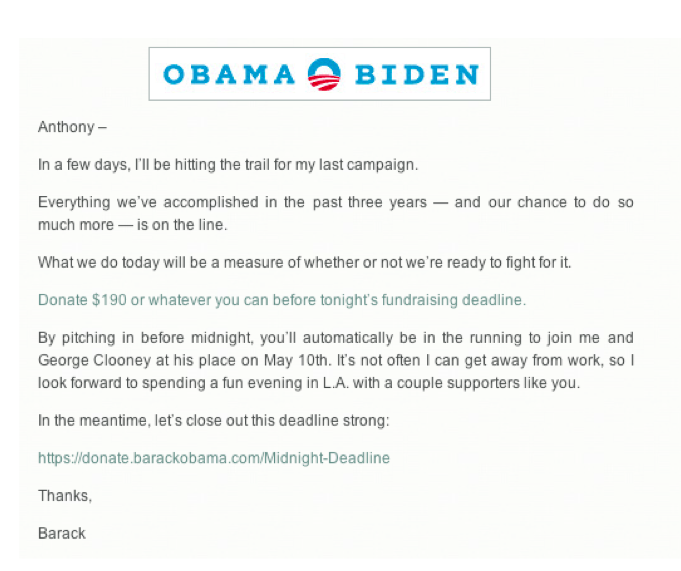Oct 08, 2012 08:15 AM EST
A new report obtained by Townhall from the non-partisan Government Accountability Institute [GAI] shows the Obama campaign has potentially violated federal election law by failing to prevent the use of fraudulent or foreign credit card transactions on the official Obama for America [OFA] donation webpage.
For the past eight months, GAI has been investigating the potential influence of foreign online campaign donations in House, Senate and presidential elections. The report was conducted using spidering software and found thousands of foreign sites linking to campaign donation pages. The investigation was conducted with the guidance of a former U.S. attorney. GAI is led by Peter Schweizer, who recently exposed congressional insider trading in his book Throw Them All Out.
“As FBI surveillance tapes have previously shown, foreign governments understand and are eager to exploit the weaknesses of American campaigns,” the report says. “This, combined with the Internet’s ability to disintermediate campaign contributions on a mass scale, as well as outmoded and lax Federal Election Commission rules, make U.S. elections vulnerable to foreign influence.”
OFA seems to be taking advantage of a “foreign donor loophole” by not using CVV on their campaign donation page. When you donate online to the Obama campaign using a credit card, the contribution webpage does not require donors to enter a secure CVV number (also known as CSC, CVV2 or CVN), the three-digit securing code on the back of credit cards. This code, although not 100 percent effective, is used to ensure a person making a purchase physically possesses the card. According to the report, 90 percent of e-commerce and 19 of the 20 largest charities in the United States use a CVV code, making its use standard industry practice in order to prevent fraud. Another anti-fraud security measure includes software, better known as an Address Verification System, to verify a donor’s address matches the address on file with the credit card company. The investigation could not determine whether OFA is using this type of software to prevent fraudulent or illegal donations.
Because of the lack of a CVV code requirement, the door is opened for OFA to accept robo-donations, or in other words, large numbers of small and automatic donations made online to evade FEC reporting requirements. Although it isn’t illegal to decline the use of a secure CVV credit card code for campaign donations, it is illegal to accept campaign donations from foreign sources. Campaigns are required under criminal code not to solicit, accept or receive foreign donations in any amount. The Federal Elections Commission doesn’t require campaigns to disclose the names of donors making contributions of less than $200 unless audited. In addition, FEC rules don’t require campaigns to keep records of those giving less than $50. These rules combined with the lack of a CVV numbers make it easy for campaigns to get away with taking foreign donations.
According to GAI, it is the duty of the campaign to “ensure compliance with the law. Indeed, they risk criminal prosecution for the conscious failure to do so. This means that whether or not the FEC requires it to be reported, campaigns have an independent duty under the law to discover and protect against criminal campaign contributions.” Protecting against criminal campaign contributions is easily accomplished by requiring a CVV code on the campaign donation page.
OFA has specifically touted its “grassroots” success by showcasing the majority of its donations coming from those giving less than $200. It appears the campaign also solicits funds for less than $200 in order to avoid having to report the name of the person making a donation under FEC rules. The GAI documents included the following email from Barack Obama to campaign supporters:
IT ALL ADDS UP
A large part of the Team Obama operation is outsourced. More than 200 domain names with the word “Obama” in the web address have been purchased. The most significant of these websites may be Obama.com, which is owned by an Obama bundler in Shanghai, China with “questionable business ties to state-run Chinese enterprises,” according to the report.
Obama.com was purchased in 2008, and, although Obama.com is owned by a third party, not the campaign itself, the site redirects its foreign traffic, a whopping 68 percent, directly to the official Obama for America campaign donation page. The Obama campaign’s official and main website, BarackObama.com, sees 43 percent of its traffic coming from foreign IP addresses, according to web metrics firm Markosweb and noted in the report.
According to industry leading web analytics site Markosweb, an anonymously registered redirect site (Obama.com) features 68 % foreign traffic. Starting in December 2011, the site was linked to a specific donation page on the official BarackObama.com campaign website for ten months. The page loaded a tracking number, 634930, into a space on the website labeled "who encouraged you to make this donation." That tracking number is embedded in the source code for Obama.com and is associated with the Obama Victory Fund. In early September 2012, the page began redirecting to the standard Obama Victory Fund donation page. Search engine optimization (SEO) efforts, using common spamming techniques, may have been undertaken by unknown third-parties, generating foreign traffic to Obama.com.China has a long history of trying to illegally influence American elections. Their efforts were most prominent in the 1990s.
In the past, foreign governments have relied on middlemen to transfer illegal campaign contributions. With the explosion of Internet campaign fundraising, the prospect of foreign powers, criminal gangs, foreign individuals, or domestic fraudsters making direct campaign contributions to American elections becomes far more likely. Put simply, campaign fundraising crimes are now just a click away. Rather than risking detection or relying on a middleman, donations can be anonymously donated through campaign websites. The state of Internet security of many political campaigns’ websites leaves American elections vulnerable to fraud or foreign influence.
CLICK HERE TO READ THE ENTIRE ARTICLE!
















No comments:
Post a Comment